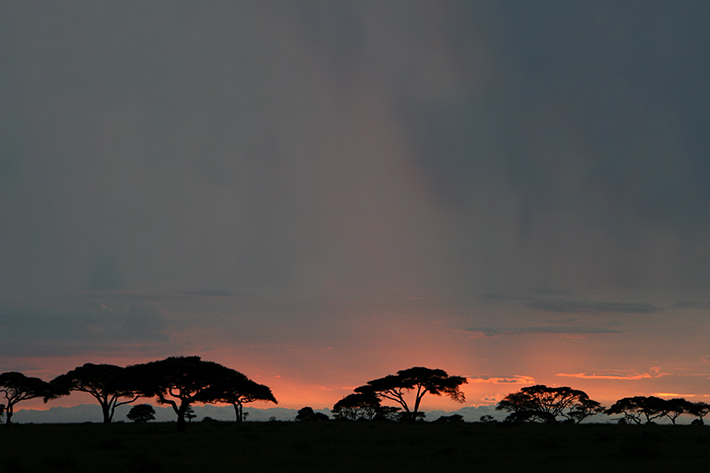|
||||||||||
| Home Nation World Business Opinion Lifestyle ChinAfrica Multimedia Columnists Documents Special Reports |
|
||||||||||
| Home Nation World Business Opinion Lifestyle ChinAfrica Multimedia Columnists Documents Special Reports |
| ChinAfrica |
| A Safari That Changed Life |
| Experiences during a honeymoon in Africa inspired new professional and lifestyle choices for a Chinese couple |
| By LI XIAOYU | VOL. 16 February 2024 ·2024-02-23 |

Li Ling with her husband Chen Zuxin and their son in the Sweetwaters Game Reserve, Kenya, in February 2018 (COURTESY)
During his tour of Africa in March 2013, Chinese President Xi Jinping shared a heartwarming story about a Chinese couple at the Julius Nyerere International Convention Centre in Tanzania. The story exemplified the strong bond between the Chinese and African peoples, evoking a powerful emotional response and receiving warm applause from the African audience.
The story was about Li Ling and her husband Chen Zuxin, who made a brilliant decision when they chose Tanzania for their honeymoon in February 2010. At the time, it was an unusual destination for Chinese tourists, but the couple knew what they wanted and went for it.
Tanzania had everything they were looking for in an unforgettable honeymoon: stunning scenery, magnificent sunsets, idyllic white sandy beaches, luxurious hotels, top-notch travel services, and, most importantly, a peaceful environment close to nature. It was the perfect choice for a romantic getaway. While prior to the trip, Africa was merely a distant dream for them, this incredible experience has caused them to fall head over heels in love with the continent.
“Our hearts will forever be attached to this fascinating land,” Li passionately told ChinAfrica.
A lasting attachment
This attachment persists even after their return from Tanzania, as the couple still feels deeply connected to Africa. Closing their eyes, they can almost feel the equatorial heat, visualise the snow of Kilimanjaro, dive into the ocean, and imagine dolphins swimming alongside them. In their spare time, they keep up to date with current events in Africa and watch new films and documentaries about the continent. Chen even resigned in 2012 to devote himself entirely to promoting tourism in East Africa with his own consultancy, Picmap.
Li’s incredible experiences in Tanzania have captured the hearts of tens of thousands of readers, who have flocked to her blog to read her stories and leave hundreds of comments. Her inspiring tales have been compiled into a book, A Once-in-a-Lifetime Holiday, which was published in 2014 and quickly became one of the first guidebooks in China dedicated to tourism in Tanzania. This comprehensive guide provides detailed information on the main towns and tourist attractions, as well as invaluable advice on responsible travel, with a focus on respecting African resources and the environment.
The couple’s love for Africa is truly profound, and they have been fortunate to visit East Africa almost every year before the COVID-19 pandemic. They even took their son with them since he was five years old, and together they explored the wonders of Tanzania, Kenya, Ethiopia, Rwanda and Uganda. It is truly a remarkable experience that they cherish deeply. Li said that visiting Africa is a unique opportunity to witness the planet in its original state, with minimal human interference.
Ecological conservation
During her visits to Africa, Li was deeply moved on many occasions. In Rwanda’s Nyungwe National Park, she witnessed the devastating consequences of the disappearance of liana-feeding forest elephants: the forest is being invaded by these climbing plants that choke the trees. This experience made her acutely aware of the urgent need to preserve biodiversity. “It is imperative that we take action to protect these precious ecosystems and the wildlife that depend on them,” she said.
Looking out over the breathtaking flamingo sanctuary on Lake Natron in northern Tanzania, she was struck by the fierce opposition of the local community to a proposed project to exploit the lake’s alkaline resources. The community is deeply concerned that the project would destroy the natural habitat of these beautiful migratory bird species.
Trekking with the mountain gorillas in Rwanda’s Volcanoes National Park was an incredible experience, where she learned that the tourist revenues generated from ecotourism are used to protect these critically endangered primates. “It’s amazing to see how ecotourism can generate vital income for conservation activities in protected areas,” she said. This experience helped her to understand the true meaning of ecotourism and the importance of supporting it.
She was inspired to see such friendly and positive attitudes towards nature and the environment, and the importance of recognising and supporting these efforts. “African people have an innate belief that they are an integral part of nature. I am particularly moved by this sense of environmental stewardship that is ingrained in their DNA,” Li said.
In turn, Li participates actively in public awareness campaigns run by WildAid, a non-profit environmental organisation, to promote wildlife conservation in China.

A magnificent view of the sunrise over the savannah in the Serengeti National Park, Tanzania, as photographed by Li Ling in February 2010 (COURTESY)
Attracting Chinese tourists
With her extensive knowledge and experience, she firmly believes that the Chinese market offers immense potential for African tourism, given its large population. However, she feels that promotional efforts at tourism fairs aimed at Chinese customers are insufficient.
“To promote Africa as the world’s top tourist destination among Chinese citizens, I highly recommend prioritising mass communication, particularly online. Let’s work together to make Africa the go-to destination for Chinese travellers,” she added. Live broadcasts of captivating scenes in Africa, such as breath-taking sunrises and sunsets in the savannah or mesmerising animal parade rituals, could effectively attract the attention of the Chinese, she suggested.
As the head of the cultural tourism sector at China Unicom, Li highly recommends that African countries embrace smart tourism by utilising data analysis to optimise the customer experience. She mentions examples of the application of new technologies in African tourism, such as applications enabling tourists to identify plants, wild animals and birds. She believes that with the engagement of Chinese companies like China Unicom in infrastructure construction, smart tourism will happen in Africa in the near future.
“We hope that more and more Chinese will be able to shake off their preconceived ideas about Africa, and really appreciate its breath-taking natural beauty, its vibrant savannah, its free-flowing wildlife, and its simple, lovable people,” Li added.
|
||||||||||||
| About Us | Contact Us | Advertise with Us | Subscribe |
| Copyright Beijing Review All rights reserved 京ICP备08005356号-5 京公网安备110102005860号 |